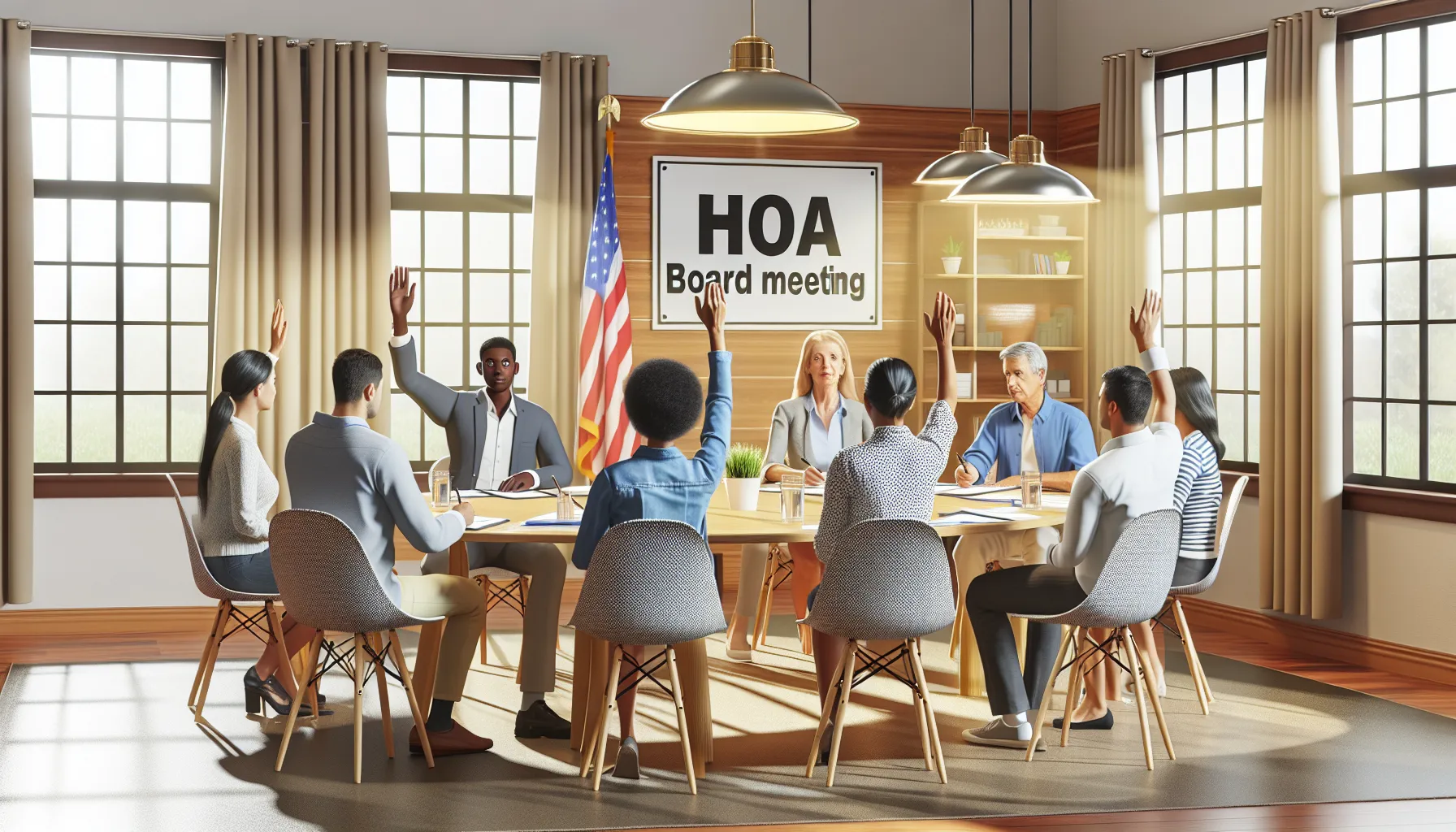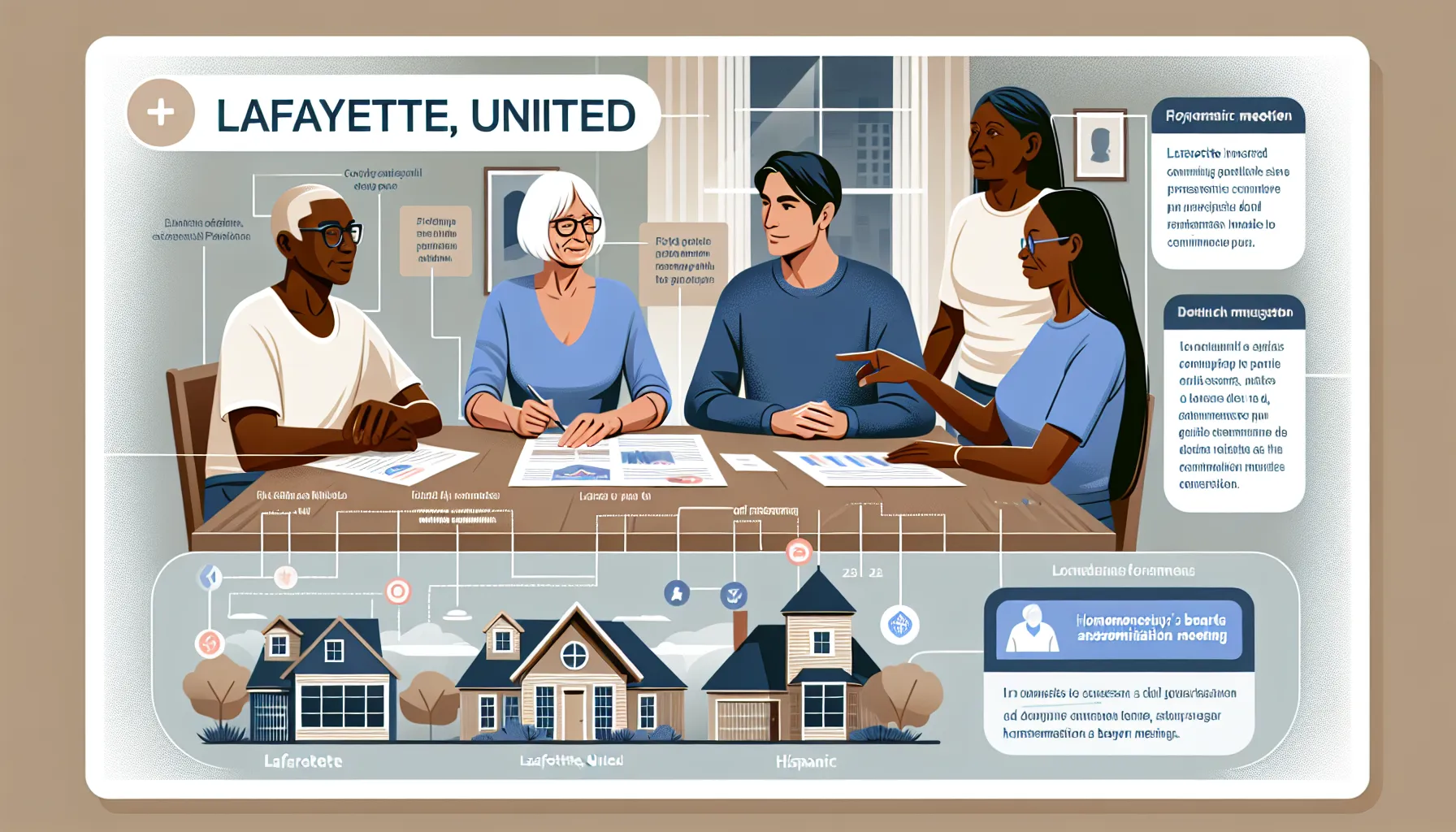Key Takeaways
- Lafayette HOA boards rely on clearly defined roles—such as President, Vice President, Treasurer, and Secretary—to ensure organized and effective community management.
- Transparent communication and open meeting procedures foster resident engagement, making it easier for homeowners to stay informed and voice their concerns.
- Regular meetings, distributed agendas, and documented decisions help maintain trust, transparency, and accountability within the community.
- Active community participation and feedback are encouraged, enabling the board to better represent homeowners’ interests and address common concerns.
- Proper record-keeping and effective onboarding for new board members contribute to organizational continuity and smooth transitions.
- Adopting best practices in HOA board organization leads to a responsive, well-managed community where all voices are valued.
Living in a Lafayette community means you’ve probably heard about the HOA board, but what does it really do? If you’ve ever wondered how decisions get made about shared spaces or why certain rules exist, you’re not alone. Many residents want clarity about how their HOA board operates and how it impacts daily life.
I know it can feel overwhelming to sort through bylaws, fees, and responsibilities. How do board members organize themselves to represent everyone’s interests? What steps can you take if you want your voice heard? Let’s explore how a well-structured HOA board works and why its organization matters for every homeowner.
Understanding Lafayette HOA Board Organization
Every Lafayette HOA board brings together volunteers dedicated to managing shared community interests. I recognize how confusing things can get with communal budgets, property rules, and ongoing projects. Have you ever wondered who decides which repairs take priority or how your dues are used?
Most boards include roles such as President, Vice President, Treasurer, and Secretary. Each member has specific responsibilities. For example, the Treasurer monitors financial statements, manages budgets, and helps approve expenses for services like annual maintenance inspections or recurring property management.
HOA meetings often involve decisions about key community activities. I see recurring topics like scheduling property inspections, planning home improvements, or overseeing insurance claims, all of which require collective agreement. For instance, if an insurance issue arises, the board coordinates claims and provides necessary documentation. When major repairs are considered, board members discuss proposals, evaluate bids, and choose vendors.
Transparent board structure helps residents know whom to approach for specific concerns. This makes it easier for you to voice feedback or ask questions about HOA fees, rule changes, and upcoming projects. Are there topics you wish the board covered more often? Your active participation influences how the board represents everyone’s needs.
Clear, structured communication keeps everyone updated. The board often circulates meeting agendas in advance and sends out summary notes afterward. This process lets all homeowners remain informed, creating opportunities for engagement and thoughtful discussions about Lafayette’s shared spaces. Have ideas for enhancing these processes? Your suggestions can spark positive changes in the way the HOA board operates.
Key Roles and Responsibilities

Every Lafayette HOA board relies on several key officers to keep things running smoothly. Let’s look more closely at each role and what it might mean for you as a resident or board member. What questions do you have about how these board members work together?
President
I set meeting agendas, preside over board meetings, and act as the main contact for residents and outside partners. I guide decisions on community improvements and work with other officers to make sure projects align with our HOA’s goals. When unexpected issues arise, I help coordinate quick responses and keep everyone informed.
Vice President
I support the president by stepping in during absences, helping with committee oversight, and handling special projects. I often draft policy updates and help with conflict resolution, so residents feel their concerns are addressed. If you’ve ever wondered about who helps the board stay on track when the president is unavailable, that’s me.
Treasurer
I manage our HOA budget, track incoming and outgoing funds, and provide clear reports to the board and homeowners. I’m accountable for collecting fees, preparing financial statements, and planning for repairs or community upgrades. Are you curious about where your fees go? I’d be happy to explain our spending.
Secretary
I keep detailed records of meetings, maintain association documents, and organize official notices to residents. By making records accessible, I make it easier for homeowners to stay connected and informed. If you have questions about past decisions or want to review meeting notes, you can reach out to me.
Committee Members
I help with tasks like organizing neighborhood events, reviewing architectural requests, or managing landscaping projects. I serve on committees to represent resident voices in specific areas, making sure each part of our community gets attention. Which committees interest you most in our HOA?
Effective Meeting Procedures

Effective meeting procedures make Lafayette HOA board actions transparent, fair, and productive. I encourage you to participate, ask questions, and share your perspective—community input shapes outcomes.
Scheduling and Agendas
Careful scheduling and clear agendas help keep meetings organized. I work with other board members to set regular dates, often with advanced notice posted on the HOA’s notice board and digital channels. Meeting agendas list topics in order, such as budget planning, maintenance updates, or policy reviews. This allows every participant to prepare and voice their opinions on issues that matter most. How do you feel about the current timing and notice methods? Sharing your feedback helps the board schedule meetings when most residents can attend.
Decision-Making Processes
Fair decision-making builds trust in the HOA board. Each discussion item follows a structured sequence: board members present updates, residents ask questions, and votes take place for major decisions. I value hearing different points of view before a motion is passed. Once a decision is made, results are recorded in meeting minutes and distributed to residents. If you’ve ever wondered how a certain rule was approved or changed, meeting records provide a clear answer and invite ongoing conversation. What improvements would help you feel more informed or included during these sessions? Let’s work together to strengthen community involvement.
Communication Within the Board and Community

Clear communication shapes every strong Lafayette HOA board. I rely on consistent updates, active listening, and quick responses to create trust among board members and residents. Meeting agendas, decision summaries, and reminders all help residents stay informed about important activities. Have you ever wished for more timely updates from your HOA board? You’re not alone—many homeowners prefer frequent, clear communication.
Transparent updates strengthen relationships. I share upcoming event notices, policy changes, and project timelines through email newsletters, printed flyers, and online platforms. Using several channels helps everyone access the details that matter to them.
Two-way communication keeps the community’s voice heard. Residents attend open meetings, ask questions, and submit concerns by email or suggestion forms. I value feedback from homeowners who want their ideas included in community plans. What have you found works best for sharing your thoughts with board members?
Board members collaborate using digital forums, group texts, and regular calls between meetings to solve problems quickly. This teamwork means we can address issues or questions without unnecessary delays.
Open communication also means documenting board actions. I provide meeting minutes for transparency, so everyone can review past decisions and discussions. Accurate records help residents stay engaged and feel respected.
What could help you feel more connected to your HOA board? Let me know your preferences, and I’ll strive to make the experience meet your needs.
Best Practices for Lafayette HOA Board Organization

Strong Lafayette HOA board organization relies on clear responsibilities and proactive engagement. Transparent roles let each member focus on specific duties. I’ve seen distinct titles like President, Treasurer, and Secretary create order while avoiding confusion. Do you find clearly defined roles helpful in your community?
Regular meetings keep board members aligned. Consistent scheduling, such as monthly or quarterly gatherings, lets everyone share updates and discuss important topics. Sending out meeting agendas ahead of time prepares both board and residents for productive conversations. Would receiving meeting agendas in advance help you feel more involved?
Open communication forms the backbone of an effective board. Sharing meeting notes, budget updates, and rule changes fosters trust. Multiple channels—like email, community apps, and flyers—reach residents with important information. Have transparent updates helped you build trust with HOA leadership?
Inviting community feedback strengthens decision-making. Question-and-answer sessions during meetings give residents a platform to voice concerns or propose ideas. Surveys allow the board to gather broad opinions on projects and budgets. How have community feedback sessions impacted your experience in HOA matters?
Proper record-keeping makes every action traceable and easy to reference. Keeping detailed minutes, financial reports, and official notices means information is available when questions come up. Accessible records support accountability and let residents track ongoing initiatives.
Effective Lafayette HOA boards also plan for smooth transitions. Training new members, providing role descriptions, and sharing historical documents prevent disruption. Are detailed onboarding processes something you think helps new board members excel?
Adopting these best practices leads to an organized, responsive HOA board. Each step directly supports a community where residents feel informed, included, and confident their voices matter.
Conclusion
When I think about what makes a Lafayette HOA board successful, it’s clear that structure and communication are at the heart of it all. A well-organized board doesn’t just run meetings smoothly—it creates a sense of trust and community among residents.
By staying proactive and open to feedback, I’ve seen how much stronger a neighborhood can become. If you’re involved with an HOA or considering joining, remember that your voice and engagement truly help shape the place you call home.
Frequently Asked Questions
What is the primary role of the HOA board in Lafayette communities?
The HOA board manages the community’s shared spaces, enforces property rules, oversees budgets, and represents homeowners’ interests. It ensures smooth operations and fair decision-making to benefit all residents.
Who serves on the HOA board and what are their responsibilities?
The board is made up of volunteers in roles such as President, Vice President, Treasurer, and Secretary. Each handles specific tasks—like leading meetings, managing finances, and keeping records—to maintain an organized community.
How are HOA board decisions made?
Decisions are made during scheduled meetings where board members present updates, answer resident questions, and vote on issues. Transparent procedures are followed, and minutes are shared with homeowners after each meeting.
How are residents kept informed about HOA activities and decisions?
Residents receive updates via email newsletters, printed flyers, online platforms, and posted meeting agendas. Meeting minutes and important notices are distributed to ensure everyone stays informed.
Can residents participate in HOA board meetings?
Yes, residents are encouraged to attend open meetings, ask questions, and give feedback. Their input helps shape community decisions and fosters a more inclusive environment.
What should I do if I have a concern or suggestion for the HOA board?
Share your concern or suggestion at an open meeting, by emailing the board, or through the HOA’s digital communication channels. The board values resident feedback and strives to address all submissions.
Why are HOA fees collected, and how are they used?
HOA fees fund the maintenance of shared spaces, property improvements, insurance, and community events. The Treasurer tracks these funds transparently, and detailed financial statements are regularly provided.
How does the board ensure transparency and accountability?
Transparency is maintained by sharing agendas, minutes, and financial reports, as well as encouraging resident questions and feedback. Detailed records of meetings and decisions are kept for accountability.
What is the importance of clear roles and best practices for the HOA board?
Assigning clear roles, organizing regular meetings, and maintaining strong communication help ensure efficiency, avoid confusion, and build resident trust, making the HOA more effective.
How can I get involved with the HOA board or committees?
You can volunteer for board positions or join a committee by contacting the HOA directly. Participation is encouraged to help strengthen the community and have your voice heard.
